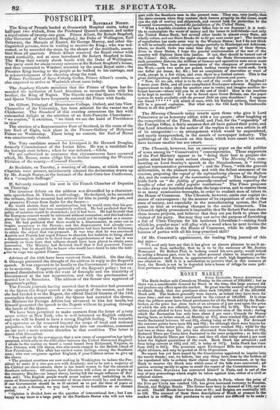We have been permitted to make extracts from the letter
of a very acute writer at New York, who is well-informed on English subjects, and who will be found to have a strong English feeling. The remarks of a spectator so far removed beyond the scope of local and national prejudices, but with so sharp an insight into our condition, command on our part a more anxious attention to that condition The letter is dated 31st December.
"You will see by the newspapers, that a new cause of exasperation has lately occurred, which adds to the difficulties between the United States and England. I allude to the mutiny on board a vessel bound from Richmond, Virginia, to New Orleans, with 135 slaves, who afterwards escaped to the British island of New Providence. This affair has excited warm feelings among the Southern men ; who vow vengeance against England, if your Cabinet refuse to give up the slaves.
"The greatest exertions are now making in Washington to induce the Pre- sident to make it a sine qua non with England; and as be aud a majority of his Cabinet are slave-owners, there is too much reason to fear the success of Southern influence. Of course, Lord Aberdeen will refuse at once to give up the runaway Blacks—no longer slaves, having felt the magic influence of Bri- tish soill The English people would never endure such backsliding in the cause of Emancipation, as a surrender of these slaves would be ; and therefore, if our Government should be so ill-advised as to put the issue of peace or war on such a demand, we may look forward to hostiliites at no distant
period. • • •
"Opinion is divided here on the question of international law; but I am happy to say there is a large party in the Northern States who will not take part with the Southern men in the present case. They say, very justly, that the slave-owners, when they venture their human property on the ocean, must run the risk of mutiny and shipwreck, and cannot look for protection to the General Government, beyond the jurisdiction of the United States. "What a horrible situation we have fallen into in our finances ! it is terri- ble to contemplate the waste of money and the losses to individuals—not only the United States Bank, but several other banks in almost every State, are wholly rotten, and our State Stocks 60 to 80 per cent under par ! The doctrine of repudiation has made some way in the Western States; but I do not think it will be actually adopted, except perhaps partially in Mississippi and Arkansas, where, no doubt, there was some false play by the agents of those States. Even in these States, I hope the general condemnation of the rest of the country will frighten them into justice. If not, they should be turned out of the Union ! But, whilst the upper classes and the State Governments are in such pecuniary distress, the millions of farmers and operatives were never more comfortable. You hear great complaints of the cheapness of provisions in the West,—pork two cents per pound, turkiea twenty-five cents each, fowls one dollar per dozen, &c. &c. ; but no complaints of starvation or want of work, except in a few cities, and even there to a limited extent. This is the great distinguishing mark between our national distress and yours. "Now, let me ask, what is to be the end of the credit system in England? I mean your Debt, and all your complicated Exchequer schemes. Suppose no improvement to take place for another year in trade; and imagine another de- ficient harvest—where will you be at the end of 1842? How is the machine to be kept in motion ? If a war be forced upon Great Britain, can the paper system be made available with the present Debt on your shoulders ? I suppose our friend will admit at once, with his Radical notions, that there will be a general explosion. But what says the Old Lady in Threadneedle Street to all this pother ?"


























 Previous page
Previous page